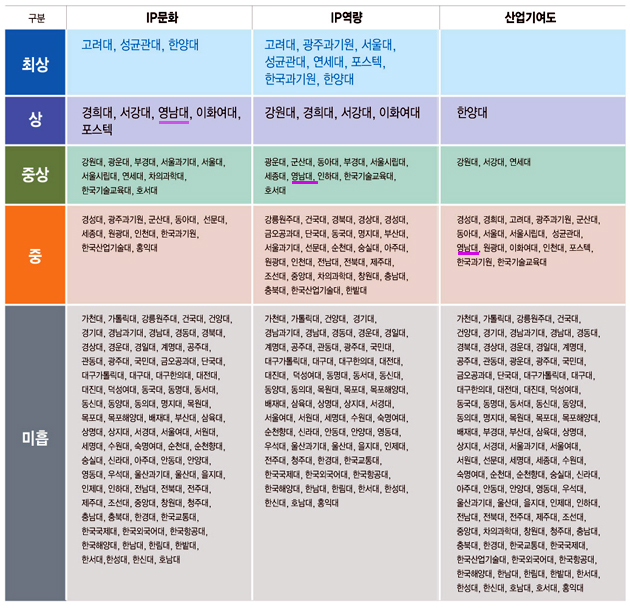In culture sector, 8th nationwide and 1st for four-year universities outside of Seoul
15th in overall evaluation for competitiveness in intellectual production, outstanding for student venture sector
Selected for 3 sectors such as Green Energy Convergence Technology of '2013 Special District Technology Business Project'
Create profits of annual 800 million won through technology transfer
[Oct 1, 2013]

YU (President Noh, Seok Kyun) was
assessed to be in the top 8 in terms of IP (Intellectual property) culture sector for the IP competitiveness evaluation. This is
first place among non-Seoul universities.
Recently, the Electronic Times announced the results of the '2013 University IP Competitiveness Evaluation'. The Electronic Times Emerging Technology Research Center, together with the Korea Patent Attorneys Association, WIPS and Neo RNS conducted a survey based on 57 indices in the 4 areas of IP culture, IP capability, global competitiveness and industry contribution for 113 four-year universities nationwide possessing more than 10 intellectual properties (patents).
The IP competitiveness evaluation that was made for the first time in Korea was executed with the belief that universities are the forward bases of the IP creation, protection and utilization ecology in the creative economy of today, and thus necessary to measure it and strengthen the national IP competitiveness. They examined the disclosure information of Higher Education in Korea, conducted on-site inspections of universities, and utilized statistical data from the Korean Intellectual Property Office for this evaluation. They organized an independent university evaluation committee and carefully assessed the universities for six months from March to September.

Results showed that in IP culture, YU was in the top 8 following Korea University, Sungkyunkwan University, Hanyang University, Kyunghee University, Sogang University, Ewha Womans University and POSTECH. It was the top for four-year universities outside of Seoul. IP capability was also 'above average' and was the only university in the Daegu and Gyeongbuk region to be placed in the top 22. For industry contribution, YU was placed in the top 8 by recording high scores in the student venture sector. In particular, YU has made considerable efforts to increase intellectual property related programs and to promote business ventures by students, receiving high scores for organizing systematic curricula.
In the overall evaluations including IP culture, IP capability, global competitiveness and industry contribution, YU ranked 15th among four-year universities. This is first place among universities in the Daegu and Gyeongbuk region. From first to 20th in overall ranking is Hanyang University, Korea University, POSTECH, Sungkyunkwan University, Gwangju Institute of Science and Technology, Yonsei University, Korea Advanced Institute of Science and Technology, Sogang University, Seoul National University, Kyunghee University, Ewha Womans University, University of Seoul, Kwangwoon University, Cha University, Dong-A University, Korea University of Technology and Education, and Hoseo University.
Meanwhile, YU's IP competitiveness is resulting in economic profits as well. In particular, in the 4 specialized areas (smart IT convergence industry, medical device and material convergence industry, green energy convergence industry, mechatronics convergence industry) of the '2013 Special District Technology Business Project', technologies possessed by the YU Technology Licensing & Business Center (director Choi, In Ho) were selected for the 3 specialized sectors. Accordingly, YU signed technology transfer contracts worth a total of 790 million won for 2 years with companies to carry out commercialization R&D, as well as a 240 million won service contracts, thus catching two birds with one stone in terms of profits from technology fees and research fees.
There are currently 3 research projects that pursue technology transfer to participating companies in the Daegu R&D special district such as the 'Development of Highly Functional Square nano-sized Titanium Dioxide Manufacturing Process' of Professor Kang, Mi Sook (46) in the Department of Chemistry (green energy convergence industry), 'Development of Multi-target Angiogenesis Inhibitor including Propenone Compounds as Active Ingredients' by Professor Kim, Jung Ae (51) of the School of Pharmacy (medical device and material convergence industry), and 'Multi-band Smart Transmitter-Receiver' by Professor Kim, Young Tak (53) of the Department of Information and Communication Engineering (smart IT convergence industry). Professor Kim, Jung Ae's (School of Pharmacy) technology was disclosed for the first time through the 'Health Industry IP Incubating Support Project in the first half of 2012' (hosted by the Korea Health Industry Development Institute). It received funding for patent consulting through the 'basic research performance utilization support project' of the National Research Foundation of Korea so that companies can procure their desired IP (intellectual property).
Through the above, YU recorded a total of 680 million won in technology transfer earnings from January to September 2013, and it is expected that they will record a total of about 800 million won by the end of the year. YU is planning to engage in more active technology transfer projects with the goal of posting more than 1 billion won in annual profits.











